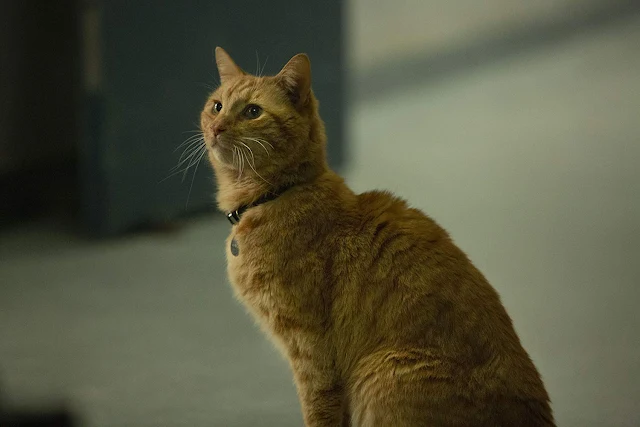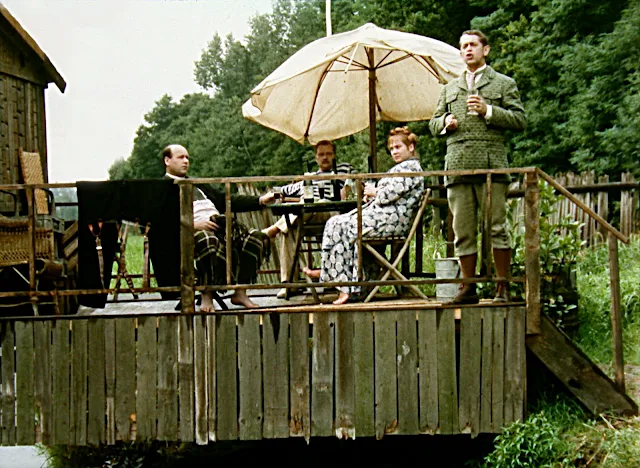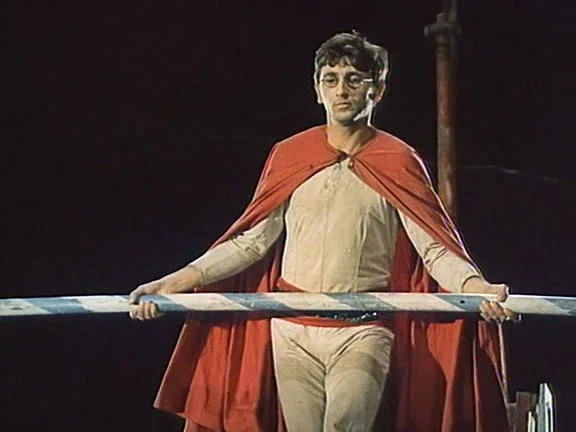A blog formerly known as Bookishness / By Charles Matthews
"Dazzled by so many and such marvelous inventions, the people of Macondo ... became indignant over the living images that the prosperous merchant Bruno Crespi projected in the theater with the lion-head ticket windows, for a character who had died and was buried in one film and for whose misfortune tears had been shed would reappear alive and transformed into an Arab in the next one. The audience, who had paid two cents apiece to share the difficulties of the actors, would not tolerate that outlandish fraud and they broke up the seats. The mayor, at the urging of Bruno Crespi, explained in a proclamation that the cinema was a machine of illusions that did not merit the emotional outbursts of the audience. With that discouraging explanation many ... decided not to return to the movies, considering that they already had too many troubles of their own to weep over the acted-out misfortunes of imaginary beings."--Gabriel García Márquez, One Hundred Years of Solitude
Search This Blog
Friday, December 27, 2019
A Christmas Tale (Arnaud Desplechin, 2008)
A Christmas Tale (Arnaud Desplechin, 2008)
Cast: Catherine Deneuve, Jean-Paul Roussillon, Anne Consigny, Mathieu Amalric, Melvil Poupaud, Hippolyte Girardot, Emmanuelle Devos, Chiara Mastroianni, Laurent Capelluto, Émile Berling, Thomas Obled, Clément Obled, François Bertin, Samir Guesmi, Azize Kabouche. Screenplay: Arnaud Desplechin, Emmanuelle Bourdieu. Cinematography: Eric Gautier. Production design: Daniel Bevan. Film editing: Laurence Briaud. Music: Grégoire Hetzel, Mike Kourtzer.
A Christmas Tale is not exactly brimful of seasonal cheer, but it warrants watching at any holiday in which families gather to both celebrate and bicker. The Vuillard clan is somewhat dysfunctional, but they're also French, which means that they smoke, drink, and talk a little too much, and have idiosyncratic ways of showing that they love one another. The matriarch, Junon (who would ever have thought Catherine Deneuve would be cast as matriarch?), has cancer and needs a bone marrow transplant. The task of searching for a donor falls to the patriarch, Abel (and who would have ever thought of bringing together the goddess-like Deneuve and the froglike Jean-Paul Roussillon?), since Junon decides at this moment to leave everything to fate. And since this crisis is coming to a head at Christmastime, it means gathering the family for more than just celebrating a holiday. There are three living children -- the first-born died of cancer as a child -- and they don't entirely get along. Elizabeth, the oldest, has banished the middle child, Henri, from her life. The youngest, Ivan, naturally has to exhibit divided loyalties when the other two get together. Elizabeth and Ivan bring along their spouses and children; Henri, unmarried, brings his latest girlfriend, Faunia, who, being Jewish, has her own slightly distant take on the Christmas festivities. Elizabeth's teenage son, Paul, has recently had a nervous breakdown. He also turns out to be a match for Junon's transplant, as does the black sheep Henri, which sets up even more grounds for dissension, especially given the tension between Henri and Elizabeth. And so, out of all this stew of tensions, director Arnaud Desplechin puts together a fascinating portrait of what it means to be a family. He mingles a variety of filmmaking techniques with a whole range of literary, cinematic, and even musical allusions to give us a multifaceted view of the Vuillards, their past, present, and perhaps future. On second thought, maybe it's best not to watch this anytime near one of your own potentially volatile family gatherings -- it cuts a little too close to home.
Thursday, December 26, 2019
Closely Watched Trains (Jirí Menzel, 1966)
Closely Watched Trains (Jirí Menzel, 1966)
Cast: Václav Neckár, Josef Somr, Vlastimil Brodský, Ferdinand Kruta, Alois Vachek, Vladimír Valenta, Jitka Bendová, Jitka Zelenohorská, Nada Urbánková. Screenplay: Bohumil Hrabal, Jirí Menzel, based on a novel by Bohumil Hrabal. Cinematography: Jaromír Sofr. Art direction: Oldrich Bosák. Film editing: Jirina Lukesová. Music: Jirí Sust.
It's a little hard to come up with the right adjective for Closely Watched Trains. "Bittersweet" doesn't quite work, nor does "tragicomic." It's one of those essentially comic films that keep you off balance by maintaining a matter-of-fact attitude toward life and death. We've all seen coming-of-age comedies about a young man's attempt to lose his virginity, but they rarely interrupt that process by a suicide attempt or end with a heroic self-sacrifice after the protagonist reaches his goal. The secret of Jirí Menzel's success at bringing off both deviations from the norm lies in the texture of his film: It's so full of little unexpected moments from characters who never quite behave in the ways we think they're going to that we come to accept their off-beat actions and attitudes. Take, for example, the subplot involving Hubicka's lovemaking with the telegraphist, during which he applies the bureaucratic stamps on the table where they consummate the affair to her bottom. She's perfectly fine with it, and even when her mother discovers the inked flesh and hauls her before the magistrate, she maintains a blissful smile during the interrogation. We've come to think of Hubicka as something of a womanizing creep, but her blithe acceptance of her role in their relationship upends (so to speak) what may have been our original view of it. She's using him at least as much as he's using her.
Captain Marvel (Anna Boden, Ryan Fleck, 2019)
Captain Marvel (Anna Boden, Ryan Fleck, 2019)
Cast: Brie Larson, Samuel L. Jackson, Ben Mendelsohn, Jude Law, Annette Bening, Djimon Hounsou, Lee Pace, Lashana Lynch, Gemma Chan, Clark Gregg, Akira Akbar. Screenplay: Anna Boden, Ryan Fleck, Geneva Robertson-Dworet, Nicole Perlman, Meg LeFauve. Cinematography: Ben Davis. Production design: Andy Nicholson. Film editing: Debbie Berman, Elliot Graham. Music: Pinar Toprak.
When I was a kid, Captain Marvel was a big guy in red long-johns and a cape who looked like a swole Fred MacMurray. But now, many years and many lawsuits later, the captain is a woman and my erstwhile superhero has taken on the name Shazam! which was the magic word that Billy Batson used to transform himself. And that's another movie -- not to mention another comics universe -- entirely, one that I hope I hope to see before too long. Captain Marvel the movie is about Carol Danvers and the origin story of her superhero alter ego. Or perhaps I should say one of the origin stories, because if you start rambling around the internet you'll find that the mighty captain has had many personae along the way. Even this origin story is a little head-spinning, involving rival alien races, abduction, amnesia, accidentally acquired superpowers, and much more. Even now, I'm not sure I can tell you for certain whether the Kree and the Skrull are the bad guys or the good guys and where Annette Bening's Dr. Lawson fits into the whole thing. Only my familiarity with Nick Fury and Phil Coulson (Samuel F. Jackson and Clark Gregg, respectively) from other Marvel movies and TV shows makes me think that Carol Danvers is doing the right thing by trusting them. Even my favorite character in the movie, Goose, is a somewhat ambiguous figure, apt to turn into a voracious many-headed monster when provoked. Good kitty. I have long since grown impatient with movies in which the credits run almost as long as the story, so the narrative complexity of Captain Marvel bored me less than the usual CGI foofaraw it sets up. Brie Larson does what she can with a character who, if she's really as invulnerable as the film implies, doesn't hold much chance for challenge and growth. I assume the sequels will show us what her Kryptonite is -- she can't just potter around the universe tidying things up forever.
Monday, December 23, 2019
Capricious Summer (Jirí Menzel, 1968)
Capricious Summer (Jirí Menzel, 1968)
Cast: Rudolf Hrusinský, Vlastimil Brodský, Frantisek Rehák, Mila Mysliková, Jana Preissová, Jirí Menzel. Screenplay: Vladimír Kalina, Jan Libora, Jirí Menzel, Václav Nývlt, based on a novel by Vladislav Vancura. Cinematography: Jaromír Sofr. Production design: Oldrich Bosák. Film editing: Jirina Lukesová. Music: Jirí Sust.
Jirí Menzel's Capricious Summer has an obvious and acknowledged debt to the films of Jean Renoir, particularly A Day in the Country (1936), which Menzel cited as one of his earliest film-watching experiences. But it also resonates for me with some of Ingmar Bergman's early comic (or less serious) films like Smiles of a Summer Night (1955) and even Wild Strawberries (1957), with their treatment of the country as a failed retreat from everyday cares. The focus of Menzel's film is on three middle-aged men whose summer idyll is blighted by the caprices of the weather, a source of constant complaint, especially from Antonín, who runs a riverside bathhouse whose business is affected by the rain. And then one day a traveling magician/tightrope walker comes to town, accompanied by his lovely assistant, Anna. Immediately, Antonín, a bluff, cigar-smoking type, and his friends Major Hugo, a retired military man, and Roch, a clergyman, are attracted to Anna in their varying ways. Antonín's wife, Katerina, on the other hand, finds delight in countering her husband's infatuation with Anna by flirting with the tightrope walker (played by Menzel himself). These dalliances are wrapped in a good deal of dialogue, in which the three men constantly spar with each other over matters relating to their own particular spheres of interest: commerce, philosophy, and warfare. There's a little action: Roch is set upon by a gang who want to thwart his relationship with Anna and has his ear partly torn off -- Antonín sews it up, using a fishhook as a needle. But mostly it's a low-key character study with moments to be smiled at, as evanescent as a summer shower.
Sunday, December 22, 2019
The Bigamist (Ida Lupino, 1953)
The Bigamist (Ida Lupino, 1953)
Cast: Edmond O'Brien, Joan Fontaine, Ida Lupino, Edmund Gwenn, Kenneth Tobey, Jane Darwell, Peggy Maley, Lilian Fontaine, Matt Dennis, John Maxwell. Screenplay: Lawrence B. Marcus, Lou Schor, Collier Young. Cinematography: George E. Diskant. Art direction: James W. Sullivan. Film editing: Stanford Tischler. Music: Leith Stevens.
There are some curiously "meta" moments in The Bigamist: At one point, Eve Graham (Joan Fontaine) says that the man who is helping arrange their adoption of a child reminds her of Santa Claus. We smile because the man is being played by Edmund Gwenn, who won an Oscar as Santa Claus in Miracle on 34th Street (George Seaton, 1947). And just in case we missed it, a little later in the film we are on a bus touring the homes of the stars in Beverly Hills and the driver announces that the house they're passing is the residence of "a little man who was Santa Claus to the whole world -- Edmund Gwenn." But then there's something meta about the whole movie: It was produced and its screenplay written by Collier Young, who was married to Fontaine after divorcing the film's other major female star, as well as its director, Ida Lupino. I suppose if you don't believe in divorce you might say that Young is the bigamist of the film's title. But that, of course, is Harry Graham, played by Edmond O'Brien, a character actor who never failed to give a subtle and insightful performance when it was called for. Here he's a weak man, the supposed head of the Graham household, who has found himself taking a back seat in the business to his wife, Eve, whom he refers to at one point as "a career woman" -- a pejorative of sorts in the 1950s. The thing of it is, when we see Eve she's always pleasant and loving -- we sense that she doesn't want to be emasculating Harry, but she's got too much intelligence not to do so. While he's on the road for their company, he gets more and more depressed about playing second fiddle to his wife, so he takes up with Phyllis Martin (Lupino), who's a little depressed herself about her failure to make her mark in the world. One thing leads to another and they get married because she's pregnant. Harry is really a nice guy at heart, but somehow he can't help himself. Finally, he spills the beans to Mr. Jordan (Gwenn), who stumbles onto Harry's double life while investigating the Grahams' fitness to adopt a child. Jordan speaks for the viewer when he says, "I can't figure out my feelings toward you. I despise you and I pity you. I don't even want to shake your hand, and yet I almost wish you luck." There are no villains to be found in The Bigamist, only flawed people getting themselves ensnared in situations they can't resolve. Fortunately, the film doesn't resolve things for us either. It ends with Harry in court where he receives a scolding from the judge, who says he will pronounce sentence a week later. Wisely, the film leaves it up to us to deliver that sentence.
Subscribe to:
Comments (Atom)


















































